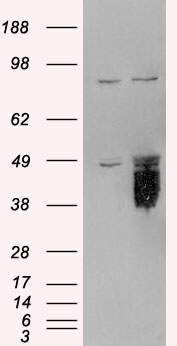Goat Anti-Tissue Factor Pathway Inhibitor Antibody
Peptide-affinity purified goat antibody
- SPECIFICATION
- CITATIONS
- PROTOCOLS
- BACKGROUND

Application
| WB, E |
|---|---|
| Primary Accession | P10646 |
| Other Accession | NP_006278, 7035 |
| Reactivity | Human |
| Host | Goat |
| Clonality | Polyclonal |
| Concentration | 100ug/200ul |
| Isotype | IgG |
| Calculated MW | 35015 Da |
| Gene ID | 7035 |
|---|---|
| Other Names | Tissue factor pathway inhibitor, TFPI, Extrinsic pathway inhibitor, EPI, Lipoprotein-associated coagulation inhibitor, LACI, TFPI, LACI, TFPI1 |
| Dilution | WB~~1:1000 E~~N/A |
| Format | 0.5 mg IgG/ml in Tris saline (20mM Tris pH7.3, 150mM NaCl), 0.02% sodium azide, with 0.5% bovine serum albumin |
| Storage | Maintain refrigerated at 2-8°C for up to 6 months. For long term storage store at -20°C in small aliquots to prevent freeze-thaw cycles. |
| Precautions | Goat Anti-Tissue Factor Pathway Inhibitor Antibody is for research use only and not for use in diagnostic or therapeutic procedures. |
| Name | TFPI |
|---|---|
| Synonyms | LACI, TFPI1 |
| Function | Inhibits factor X (X(a)) directly and, in a Xa-dependent way, inhibits VIIa/tissue factor activity, presumably by forming a quaternary Xa/LACI/VIIa/TF complex. It possesses an antithrombotic action and also the ability to associate with lipoproteins in plasma. |
| Cellular Location | [Isoform Alpha]: Secreted. |
| Tissue Location | Mostly in endothelial cells. |

Thousands of laboratories across the world have published research that depended on the performance of antibodies from Abcepta to advance their research. Check out links to articles that cite our products in major peer-reviewed journals, organized by research category.
info@abcepta.com, and receive a free "I Love Antibodies" mug.
Provided below are standard protocols that you may find useful for product applications.
Background
This gene encodes a protease inhibitor that regulates the tissue factor (TF)-dependent pathway of blood coagulation. The coagulation process initiates with the formation of a factor VIIa-TF complex, which proteolytically activates additional proteases (factors IX and X) and ultimately leads to the formation of a fibrin clot. The product of this gene inhibits the activated factor X and VIIa-TF proteases in an autoregulatory loop. The encoded protein is glycosylated and predominantly found in the vascular endothelium and plasma in both free forms and complexed with plasma lipoproteins. Several alternatively spliced transcript variants of this gene have been described, but the full-length nature of some of these variants has not been confirmed.
References
Variation at the NFATC2 Locus Increases the Risk of Thiazolinedinedione-Induced Edema in the Diabetes REduction Assessment with ramipril and rosiglitazone Medication (DREAM) Study. Bailey SD, et al. Diabetes Care, 2010 Jul 13. PMID 20628086.
Functional characterization of polymorphisms in the human TFPI gene. Skretting G, et al. Biochem Biophys Res Commun, 2010 Jun 18. PMID 20519147.
Tissue factor pathway inhibitor polymorphisms in women with and without a history of venous thrombosis and the effects of postmenopausal hormone therapy. Opstad TB, et al. Blood Coagul Fibrinolysis, 2010 Sep. PMID 20453636.
Gender differences of polymorphisms in the TF and TFPI genes, as related to phenotypes in patients with coronary heart disease and type-2 diabetes. Opstad TB, et al. Thromb J, 2010 May 5. PMID 20444258.
Gene variants associated with venous thrombosis: confirmation in the MEGA study. Arellano AR, et al. J Thromb Haemost, 2010 May. PMID 20128871.
If you have used an Abcepta product and would like to share how it has performed, please click on the "Submit Review" button and provide the requested information. Our staff will examine and post your review and contact you if needed.
If you have any additional inquiries please email technical services at tech@abcepta.com.













 Foundational characteristics of cancer include proliferation, angiogenesis, migration, evasion of apoptosis, and cellular immortality. Find key markers for these cellular processes and antibodies to detect them.
Foundational characteristics of cancer include proliferation, angiogenesis, migration, evasion of apoptosis, and cellular immortality. Find key markers for these cellular processes and antibodies to detect them. The SUMOplot™ Analysis Program predicts and scores sumoylation sites in your protein. SUMOylation is a post-translational modification involved in various cellular processes, such as nuclear-cytosolic transport, transcriptional regulation, apoptosis, protein stability, response to stress, and progression through the cell cycle.
The SUMOplot™ Analysis Program predicts and scores sumoylation sites in your protein. SUMOylation is a post-translational modification involved in various cellular processes, such as nuclear-cytosolic transport, transcriptional regulation, apoptosis, protein stability, response to stress, and progression through the cell cycle. The Autophagy Receptor Motif Plotter predicts and scores autophagy receptor binding sites in your protein. Identifying proteins connected to this pathway is critical to understanding the role of autophagy in physiological as well as pathological processes such as development, differentiation, neurodegenerative diseases, stress, infection, and cancer.
The Autophagy Receptor Motif Plotter predicts and scores autophagy receptor binding sites in your protein. Identifying proteins connected to this pathway is critical to understanding the role of autophagy in physiological as well as pathological processes such as development, differentiation, neurodegenerative diseases, stress, infection, and cancer.



